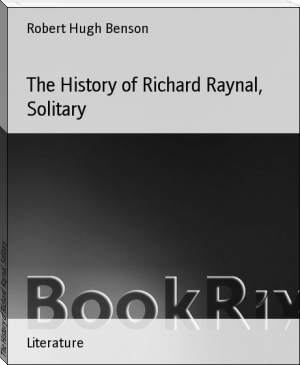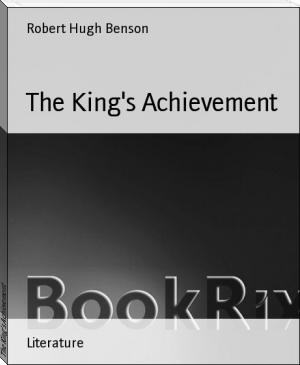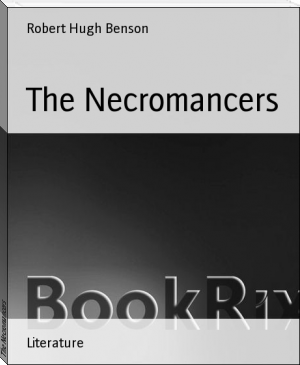The Necromancers by Robert Hugh Benson (motivational books for women .TXT) 📖

- Author: Robert Hugh Benson
- Performer: -
Book online «The Necromancers by Robert Hugh Benson (motivational books for women .TXT) 📖». Author Robert Hugh Benson
He began to be intensely and minutely conscious of the world outside—so entirely conscious that he lost all perception of that at which he stared; whether it was the paper, or the strong, motionless hand, or the introspective face, he was afterwards unaware. But he heard all the quiet roar of the London evening, and was able to distinguish even the note of each instrument that helped to make up that untiring, inconclusive orchestra. Far away to the northwards sounded a great thoroughfare, the rolling of wheels, a myriad hoofs, the pulse of motor vehicles, and the cries of street boys; upon all these his attention dwelt as they came up through the outward windows into that dead silent, lamp-lit room of which he had lost consciousness. Again a hansom came up the street, with the rap of hoofs, the swish of a whip, the wintry jingle of bells....
He began gently to consider these things, to perceive, rather than to form, little inward pictures of what they signified; he saw the lighted omnibus, the little swirl of faces round a news-board.
Then he began to consider what had brought him here; it seemed that he saw himself, coming in his dark suit across the park, turning into the thoroughfare and across it. He began to consider Amy; and it seemed to him that in this intense and living silence he was conscious of her for the first time without sorrow since ten days ago. He began to consider.
Something brought him back in an instant to the room and his perception of it, but he had not an idea what this was, whether a movement or a sound. But on considering it afterwards he remembered that it was as that sound is that wakes a man at the very instant of his falling asleep, a sharp momentary tick, as of a clock. Yet he had not been in the least sleepy.
On the contrary, he perceived now with an extreme and alert attention the hand on the paper; he even turned his head slightly to see if the pencil had moved. It was as motionless as at the beginning. He glanced up, with a touch of surprise, at his hostess's face, and caught her in the very act of turning her eyes from his. There was no impatience in her movement: rather her face was of one absorbed, listening intently, not like the bearded face opposite, introspective and intuitive, but eagerly, though motionlessly, observant of the objective world. He looked at Mrs. Stapleton. She too bore the same expression of intent regarding thought on her usually rather tiresome face.
Then once again the silence began to come down, like a long, noiseless hush.
This time, however, his progress was swifter and more sure. He passed with the speed of thought through those processes that had been measurable before, faintly conscious of the words spoken before the sitting began—
"... If possible, the silence of thought."
He thought he understood now what this signified, and that he was experiencing it. No longer did he dwell upon, or consider, with any voluntary activity, the images that passed before him. Rather they moved past him while he simply regarded them without understanding. His perception ran swiftly outwards, as through concentric circles, yet he was not sure whether it were outwards or inwards that he went. The roar of London, with its flight of ocular visions, sank behind him, and without any further sense of mental travel, he found himself perceiving his own home, whether in memory, imagination, or fact he did not know. But he perceived his mother, in the familiar lamp-lit room, over her needlework, and Maggie—Maggie looking at him with a strange, almost terrified expression in her great eyes. Then these too were gone; and he was out in some warm silence, filled with a single presence—that which he desired; and there he stopped.
He was not in the least aware of how long this lasted. But he found himself at a certain moment in time, looking steadily at the white paper on the table, from which the hand had gone, again conscious of the sudden passing of some clear sound that left no echo—as sharp as the crack of a whip. Oh! the paper—that was the important point! He bent a little closer, and was aware of a sharp disappointment as he saw it was stainless of writing. Then he was astonished that the hand and pencil had gone from it, and looked up quickly.
Mr. Vincent was looking at him with a strange expression.
At first he thought he might have interrupted, and wondered with dismay whether this were so. But there was no sign of anger in those eyes—nothing but a curious and kindly interest.
"Nothing happened?" he exclaimed hastily. "You have written nothing?"
He looked at the ladies.
Lady Laura too was looking at him with the same strange interest as the medium. Mrs. Stapleton, he noticed, was just folding up, in an unobtrusive manner, several sheets of paper that he had not noticed before.
He felt a little stiff, and moved as if to stand up but, to his astonishment, the big man was up in an instant, laying his hands on his shoulders.
"Just sit still quietly for a few minutes," said the kindly voice. "Just sit still."
"Why—why—" began Laurie, bewildered.
"Yes, just sit still quietly," went on the voice; "you feel a little tired."
"Just a little," said Laurie. "But—"
"Yes, yes; just sit still. No; don't speak."
Then a silence fell again.
Laurie began to wonder what this was all about. Certainly he felt tired, yet strangely elated. But he felt no inclination to move; and sat back, passive, looking at his own hands on his knees. But he was disappointed that nothing had happened.
Then the thought of time came into his mind. He supposed that it would be about ten minutes past six. The sitting had begun a little before six. He glanced up at the clock on the mantelpiece; but it was one of those bulgy-faced Empire gilt affairs that display everything except the hour. He still waited a moment, feeling all this to be very unusual and unconventional. Why should he sit here like an invalid, and why should these three sit here and watch him so closely?
He shifted a little in his chair, feeling that an effort was due from him. The question of the time of day struck him as a suitably conventional remark with which to break the embarrassing silence.
"What is the time?" he said. "I am afraid I ought to be—"
"There is plenty of time," said the grave voice across the table.
With a sudden movement Laurie was on his feet, peering at the clock, knowing that something was wrong somewhere. Then he turned to the company bewildered and suspicious.
"Why, it is nearly eight," he cried.
Mr. Vincent smiled reassuringly.
"It is about that," he said. "Please sit down again, Mr. Baxter."
"But—but—" began Laurie.
"Please sit down again, Mr. Baxter," repeated the voice, with a touch of imperiousness that there was no resisting.
Laurie sat down again; but he was alert, suspicious, and intensely puzzled.
"Will you kindly tell me what has happened?" he asked sharply.
"You feel tired?"
"No; I am all right. Kindly tell me what has happened."
He saw Lady Laura whisper something in an undertone he could not hear. Mr. Vincent stood up with a nod and leaned himself against the mantelpiece, looking down at the rather indignant young man.
"Certainly," he said. "You are sure you are not exhausted, Mr. Baxter?"
"Not in the least," said Laurie.
"Well, then, you passed into trance about five minutes—"
"What?"
"You passed into trance about five minutes past six; you came out of it five minutes ago."
"Trance?" gasped Laurie.
"Certainly. A very deep and satisfactory trance. There is nothing to be frightened of, Mr. Baxter. It is an unusual gift, that is all. I have seldom seen a more satisfactory instance. May I ask you a question or two, sir?"
Laurie nodded vaguely. He was still trying hopelessly to take in what had been said.
"You nearly passed into trance a little earlier. May I ask whether you heard or saw anything that recalled you?"
Laurie shut his eyes tight in an effort to think. He felt dimly rather proud of himself.
"It was quite short. Then you came back and looked at Lady Laura. Try to remember."
"I remember thinking I had heard a sound."
The medium nodded.
"Just so," he said.
"That would be the third," said Lady Laura, nodding sagely.
"Third what?" said Laurie rather rudely.
No one paid any attention to him.
"Now can you give any account of the last hour and a half?" continued the medium tranquilly.
Laurie considered again. He was still a little confused.
"I remember thinking about the streets," he said, "and then of my own home, and then..." He stopped.
"Yes; and then?"
"Then of a certain private matter."
"Ah! We must not pry then. But can you answer one question more? Was it connected with any person who has crossed over?"
"It was," said Laurie shortly.
"Just so," said the medium.
Laurie felt suspicious.
"Why do you ask that?" he said.
Mr. Vincent looked at him steadily.
"I think I had better tell you, Mr. Baxter; it is more straightforward, though you will not like it. You will be surprised to hear that you talked very considerably during this hour and a half; and from all that you said I should suppose you were controlled by a spirit recently crossed over—a young girl who on being questioned gave the name of Amy Nugent—"
Laurie sprang to his feet, furious.
"You have been spying, sir. How dare you—"
"Sit down, Mr. Baxter, or you shall not hear a word more," rang out the imperious, unruffled voice. "Sit down this instant."
Laurie shot a look at the two ladies. Then he remembered himself. He sat down.
"I am not at all angry, Mr. Baxter," came the voice, suave and kindly again. "Your thought was very natural. But I think I can prove to you that you are mistaken."
Mr. Vincent glanced at Mrs. Stapleton with an almost imperceptible frown, then back at Laurie.
"Let me see, Mr. Baxter.... Is there anyone on earth besides yourself who knew that you had sat out, about ten days ago or so, under some yew trees in your garden at home, and thought of this young girl—that you—"
Laurie looked at him in dumb dismay; some little sound broke from his mouth.
"Well, is that enough, Mr. Baxter?"
Lady Laura slid in a sentence here.
"Dear Mr. Baxter, you need not be in the least alarmed. All that has passed here is, of course, as sacred as in the confessional. We should not dream, without your leave—"
"One moment," gasped the boy.
He drove his face into his hands and sat overwhelmed.
Presently he looked up.
"But I knew it," he said. "I knew it. It was just my own self which spoke."
The medium smiled.
"Yes," he said, "of course that is the first answer." He placed one hand on the table, leaning forward, and began to play his fingers as if on a piano. Laurie watched the movement, which seemed vaguely familiar.
"Can you account for that, Mr. Baxter? You did that several times. It seemed uncharacteristic of you, somehow."
Laurie looked at him, mute. He remembered now. He half raised a hand in protest.
"And ... and do you ever stammer?" went on the man.
Still Laurie was silent. It was beyond belief or imagination.
"Now if those things were characteristic—"
"Stop, sir," cried the boy; and then, "But those too might be unconscious imitation."
"They might," said the other. "But then we had the advantage of watching you. And there were other things."
"I beg your pardon?"
"There was the loud continuous rapping, at the beginning and the end. You were awakened twice by these."
Laurie remained perfectly motionless without a word. He was still striving to marshal this flood of mad ideas. It was incredible, amazing.
Then he stood up.
"I must go away," he said. "I—I don't know what to think."
"You had better stay a little longer and rest," said the medium kindly.
The boy shook his head.
"I must go at once," he said. "I cannot trust myself."
He went out without
 Reading books romantic stories you will plunge into the world of feelings and love. Most of the time the story ends happily. Very interesting and informative to read books historical romance novels to feel the atmosphere of that time.
Reading books romantic stories you will plunge into the world of feelings and love. Most of the time the story ends happily. Very interesting and informative to read books historical romance novels to feel the atmosphere of that time.




Comments (0)